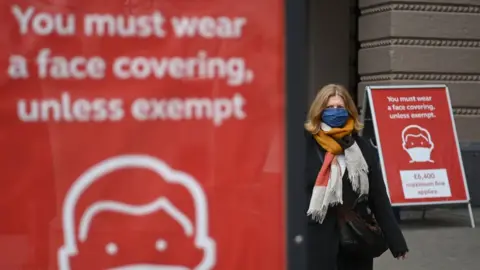Coronavirus: How are people breaking the rules?
 EPA
EPAAttitudes towards coronavirus restrictions have changed as the pandemic has gone on. But how do people feel about the future? And are they sticking to the rules?
Worried. Sad. Disappointed. Confused. Concerned.
With the clocks about to go back, winter on its way, and the Covid graphs heading in the wrong direction, the mood of those interviewed in a recent poll of more than 2,000 people paints a fairly bleak picture.
The survey, by Britain Thinks, suggests more than two-thirds of people (68%) are pessimistic about the UK's immediate future, up 10% from when the survey question was asked in the summer of 2019. Young people are particularly gloomy about the country's prospects, only 29% of 18-24 year olds express optimism about their future in the next year or so.
A focus group from across the UK, assembled for BBC News by Britain Thinks, echoed the melancholy tone.
"Things are quite bleak," said Jim, a 61-year-old engineer from Belfast. "Coming up to Christmas with the dark evenings coming in and the prospect that there isn't much light at the end of the tunnel."
Alan, a full-time carer in Liverpool, agreed. "I think Christmas will be a write-off and I think January into February next year will be a write-off as well."
But it wasn't all pessimism. Michael, a decorator from Peterborough, was more optimistic. "You can't change anything. You just make the best of what you've got."
When it came to what should happen next, Molly, a 23-year-old customer services advisor from Liverpool, told us she believes the patchwork of rules across the UK is a problem. "The only way I think everyone would listen would probably be if there was a united one-rule-for-all - because everyone thinks if other areas aren't having the same restrictions that's unfair."
Maureen, a retired butcher from Belfast, argues for a national lockdown. "We're getting mixed messages and you get yourself into a muddle where you don't know what restrictions are 'we' and what restrictions are 'they'."
But Michael disagreed with the idea of a circuit-breaker or a total lockdown. "It just doesn't make sense to close people's businesses, the government and politicians - it doesn't affect them. It only affects people like us."
Analysis of the Britain Thinks polling suggests there are four key factors shaping the country's mood: the virus, the economy and jobs, divisions in society, and a lack of faith in government.
Some 73% of people agreed "it's one rule for them and another for us" when it comes to the pandemic. The same proportion were pessimistic about the economy, with 89% expecting the cost of living to go up in the next year.
Almost three-quarters (74%) thought the country would become more divided, with just 12% saying that UK politicians understood people like them.
Breaking the rules
Separate polling by Ipsos MORI suggests a quarter of people admit they are not following the government coronavirus rules. That clearly means the majority are, and the survey suggests Britain's overwhelming adherence to the rules has become stronger in the past month.
The online poll - of 1,067 adults in Great Britain between October 16 and 19 - found 73% of people questioned had followed the rules "completely" or "nearly all the time".
Of the 27% who admitted breaking the rules, four in ten said they had broken social distancing guidelines. One in five said they had gone on prohibited visits to friends and family.
Ipsos MORI chief executive Ben Page said the number of people who say they have complied with the measures has "actually risen with the second wave of the virus". He said: "Most people remain far more concerned about the virus than the economy."
Back in March, as the government placed the country into lockdown, there was broad consensus on the need for blanket restrictions. This time, fierce arguments are raging over the manner and nature of the controls, disharmony that surveys suggest is feeding a sense that the government has not got a grip on the crisis.
The previous spike in infections came in the spring, with the prospect that warmer weather would make it easier to control the virus. This time the infection rate is rising as temperatures are falling, with warnings from government scientific advisors that the traditional family Christmas may be a casualty of the pandemic.
For many, the prospect of a winter without festivities adds to the sense of disappointment and despondency. Politically, economically and socially, the next few months are likely to be a huge test of the nation's fortitude and resilience.

- TESTING: How do I get a virus test?
- SYMPTOMS: What are they and how to guard against them?
- YOUR QUESTIONS: We answer your queries
- TREATMENT: How close are we to helping people?
- WHERE I LIVE: How many cases?

